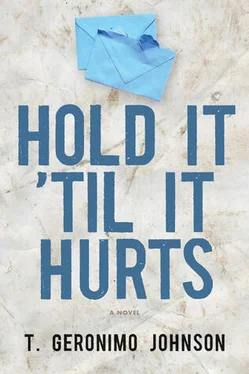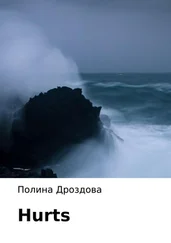Mrs. Deleseppes’s neighborhood didn’t even look like it was in the same city as Mrs. Robicheaux’s. No one was stranded, and appliances were the most common casualties. They lined the streets like fat kids awaiting the short bus, except many had been shot by angry owners.
After a few days with Charlie 1, he and Bryant were assigned night patrol to look for looters. Days were miserable because, with most of the trees gone, there wasn’t any shade. But at night it was peaceful, and cool enough to enjoy the ride, if not for the stench. They each carried a flashlight, and the boat was equipped with two searchlights, but by unspoken agreement they kept the light to a minimum. After thirty minutes of silence, Bryant shared his concern about deployment, about how much he didn’t want to go. “I know I’m not supposed to go.”
You’re right to be worried, thought Achilles. Anything could happen. Ines once explained what she had thought before she went to Afghanistan: “You hear it all about war. Bravery, depravity, insanity, terror, heroism. Lazy days followed by nights bright with artillery. Guys who charge bullets and break through doors without a scratch. Child snipers. Local police who turn on you without warning. Friendly fire. Frisbee golf on the edge of minefields. Men who run from their shadows, and men who jump on grenades. And the crazy thing was that it was all true, every last bit of it, at the same time. I was in a minefield. Three men were there. Two walked away, one saved my life.”
Bryant was right to be worried. How could Achilles explain that? How could he explain why it changed you? That sometimes you looked at people you loved and pictured them dead and bleeding because you’d seen it happen so many times before. How could he explain that even if you enlisted because you thought, foolishly, that your country needed you, after arriving you realized that friends were what mattered, that man could not live by God and country alone? Achilles never wanted to go back, but if Wages and Troy and Merriweather and Wexler could all go back, he’d be there in a heartbeat, riding in an APC, blasting “Prison Sex” and “Welcome to the Jungle,” wearing his battle rattle and a smile, this time sounding the drum in his chest. Bryant would feel the same way after a few weeks, especially if someone got hurt. Vodka and Wilson were focused. Daddy Mention talked a lot, like Merriweather; surely he was as reliable. He’d been through it once already. “You’ve got a good team,” said Achilles.
Bryant grunted. “It’s all wrong. It’s just not the time for me. My girlfriend and I just got engaged two months ago. I know she’s been with her ex. That’s why I proposed, to make it real, to let her know I only want to be with her, and this hurricane fucked my shit up. I’m not even supposed to be gone for another two weeks. We were going to Vegas to get married, and now this shit. She probably only said yes because she doesn’t expect me to make it back.”
“Don’t think about all that Jody shit. A lot of women wait. Mine did.”
Someone shot off a couple of bottle rockets. Bryant ducked, dropping his weapon. He laughed when he saw the dim burst. “There is no God but M16, and I am his messenger.”
Achilles recognized the look of thin confidence. It would become real. The act would become the actor. Within weeks, Bryant would be a sheep in wolf’s clothing. There was no other choice; like the saying went: Don’t bring a stick to a knife fight.
More fireworks. Bryant said, “Now we’re on the Pirates of the Caribbean.”
Achilles considered that a fair description. He’d been trying to find something to compare the experience to but nothing came close. He’d seen photos of Venice with its proud statues and marble domes, an armada of floating castles. New Orleans looked as if it were floating — the porches were impromptu docks, the sidewalks sandbars, the roads rivers — but it wasn’t. No. Nola lay facedown, suffocating under a blanket of water over which they now traveled as if it were a highway.
They drifted for blocks, sometimes brushing against cars. Residential streets felt like flood zones, but the business district was postapocalyptic. To travel by water between soaring office buildings with gaping windows — buildings so tall that even the boat’s high-powered beams couldn’t reach the roofs — frightened Achilles. The taller buildings all seemed to be leaning in, as if they would fall on the boat, if they weren’t already touching at the top.
Passing between One Shell Square and Poydras Center, the scale of man’s reach was now apparent, and they fell silent. Something plucked the water near them, then again. Another splash. They looked up but couldn’t see anything. Bryant killed the engine, cutting all the lights, even the dim glow from the control panel. Achilles was tempted to tell him to turn it back on. In the last seconds as the light receded, it seemed the darkness was collapsing on them, bringing the buildings with it, crushing them. The rocking of the boat now felt exaggerated, and Achilles was aware of his knees swinging up and down as he struggled to maintain his balance. He heard the waters smacking against the boat, the cars, the skyscrapers, the entire earth in motion, nothing solid in sight. He tentatively stuck his hand out, feeling for the edge of the boat, and sat. Off his feet, rocking in the seat, he felt even less in control and reached for the rail to push himself up, but missed it and his hand grazed the water. He yanked it back to his chest, anxiously wiping it off. The boat bumped into a stationary object, nearly throwing Achilles over the side.
The darkness, his body rocking, his wet hand. The sound of the water, his heart, Bryant breathing. The moon moved out of the clouds and his eyes adjusted just enough to make out the water, the flat edges of the buildings, the cars hunched like turtles, buses like whales, and the water — a moving mirror, liquid glass that revealed only death, a great oily eye, black, inky, like a river of paint gently unrolling over itself, eating everything, one moment small crests reflecting the stars, the next moment small waves standing up and swallowing them. Brackish water slapped against a car and splashed back, and a thousand small drops arced like a bristling black cat. In the boat’s wake water rose, scaling the side of a capsized bus, snaking along the windows, sketching a wet web over the door. A cloud passed above and drew a curtain across what little light there was, and it all became one: the water, the stench in the angry air, the rocking, the whole night fashioned after a noose. Tightening. He had never felt this anxious in Goddamnistan. Bryant flipped the light back on, pushing back the darkness just in time. Achilles had felt the waters would never recede, would never concede. The river would give nothing back; it would eat them all, inch by inch, winding around the city like a boa constrictor and pushing and pushing until everywhere it met only itself. Several minutes passed before he was breathing normally again.
When they passed under I-10/US-90, Bryant threw bottles of water to the people stranded above. They were met with thanks and curses, and one clear, plaintive voice asking, “Can’t you give us a ride? Please?” Bryant ran his light along the bottom of I-90, trying to see where it ended. “Where does that road lead?” he asked Achilles.
“Across the river,” said Achilles.
“Why don’t they just cross the river? It isn’t flooded over there.”
“I don’t know,” said Achilles. He didn’t know how to explain the roadblock that the Gretna police had set up to keep survivors out. Besides, those reports might not even be true. They were too senseless to be true, as was the alleged shooting on the Danzinger bridge or the vigilantes in Algiers shooting blacks. “Take me back.”
Читать дальше












